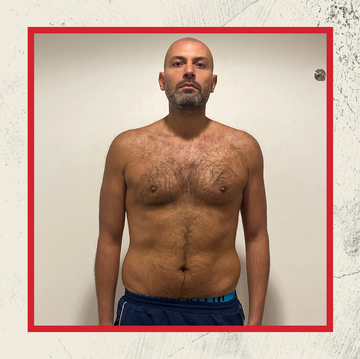EZYLFIE TAYLOR WAS 22-years-old when he started working for the insurance company New York Life. There, Taylor quickly reached the ranking of number one broker in Los Angeles and number one agent for the company's African-American market.
The Taylor Method founder has been mentioned in various publications including Business Insider and Adweek. But beyond his financial career success, Taylor is also a father of three, committed to health and fitness, and an advocate of mental health.
“If you're not healthy, strong, and able bodied, you're not going to be able to make money. Money is the last piece. Having a strong mind and a strong body will allow you to make money,” says Taylor.
And now Taylor has a new TV show, Mind. Body. Money., which premiered in October and airs Fridays at 7:00 pm EST (check local listings here).
Here's what Taylor has to say about saving money this holiday season—and well beyond.
Editor's Note: This interview has been edited for clarity.
Men’s Health (MH): You achieved success at such a young age. What tools did you use to make that possible?
Eszylfie Taylor (ET): Pure grit. I experienced a lot of struggle, a lot of challenges. I wanted to be great, and I wanted to do amazing things in my career. I recognized in order to make waves early in my career, I had to take a lot of risks and bet on myself. That didn't always come with trophies. It came with more headaches and heartache than anything else. Grit and resilience are some of the key attributes that achieve success in business.
MH: How do you integrate finances into a healthy lifestyle?
ET: Being a good steward of your money will relieve stress and then give you the energy and the desire to get out there and move your body. My mantra is a little bit different. I don't start with the money piece. Health and wellness is important, that's second.
MH: What are three things consumers should know about the economy now?
ET: Cost of goods and services has grown at an astronomical rate. That's something to be mindful of. The cost of the grocery store, the cost of the pump, everything's gone up. So, you want to be a better steward of your money. Interest rates have also risen. That's a good thing when you're trying to earn a rate of return on your money, a bad thing when you're trying to when you're borrowing it. We've seen the price interest rates associated with a mortgage more than doubled this last year. The challenging thing is if you're buying your purchasing power is essentially slashed in half. Remember that this is a marathon, not a sprint.
MH: Let’s talk about the holidays. How do you go about managing your finances during the holidays?
ET: Maya Angelou said “people won't remember what you said, people won't remember what you did, but they will remember how you made them feel.” The holidays aren't about gifts. The holidays aren't about eating. It’s about celebrating family. It's about community.
MH: Do you have any financial tricks to cut down holiday spending?
ET: I'd say one of the biggest things to cut down on is waiting until the last minute and overpaying. One piece of advice that I'd give people is Christmas shopping year round. The best time to buy Christmas decorations is on January 1st because whatever the stores didn't sell are usually 50 to 75 percent off.
MH: What is one rule you should follow while buying gifts?
ET: Stay within your means. I always tell people affordability should drive your purchase decisions. If something doesn't make sense, if it doesn't fit in the budget, don't do it.
MH: What is one money mistake you made as a parent?
ET: I'm trying to be more mindful, make sure that my girls don't lose sight of the value of money, and what it actually takes to maintain this life. Whether it be detours or getting a job so that they understand the value that hard work comes from sacrifice.
MH: Do you have any tips for parents who are struggling with finances?
ET: My advice to parents and this is that you have to make sure that your financial house is in order before you start putting things away and spending money. It's like an airplane. When you're flying, the TSA announcement comes on and says there's a drop in cabin pressure, and the oxygen mask comes down. They tell you to put your mask on first, and then help the person next to you. I would say you want to make sure that your house is in order first. Do you have adequate insurance? Do you have adequate investments? Do you have adequate retirement? Is your debt under control? If the answer is yes, there's still resources to help the kids by all means do so, but make sure your house is in order first. Then the kids, not the other way around.
MH: You have a series called Mind. Body. Money. You help celebrities, sports legends, and Fortune 500 companies navigate the challenges in the world of finance. What tips do you give them?
ET: It’s all about making a plan. If you aim at nothing, you'll hate it. A good amount of my work is simply marrying people's declared objectives with an action plan and making sure they're on the most efficient path.
MH: How do you balance marriage, kids, and a flourishing career?
ET: As I get older, it’s more about giving myself grace, and not being so focused on the future. For the first probably ten to 15 years of my career, I was so focused on where I wanted to be that I wasn't taking inventory of the blessings in front of me. Tomorrow's today's gift, that's why they call it the present.
MH: As a Black man in the finance world, it can be tough. Have you faced any obstacles because of that?
ET: There's a lot of industry events and awards dinners I've been to. I'm the only one that looks like me. Yeah, I stand out. I look at that more as a blessing and a key differentiator for me.
MH: What is a good financial literacy tip to someone who may not know a lot about finance?
ET: Align yourself with people that are living a life and doing the things that you want. Most successful people are more than happy to share their journey. You get a lot more money from people's mistakes than you do from the things they did. Follow the tips, tools, and insights of those who've come before you.














